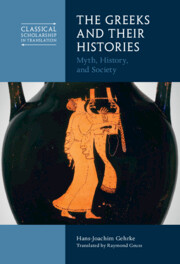Book contents
- The Greeks and Their Histories
- Classical Scholarship in Translation
- The Greeks and Their Histories
- Copyright page
- Contents
- Foreword
- Preface to the German Edition
- Preface
- Note on Abbreviations
- Introduction
- Chapter 1 The Locus of Intentional History
- Chapter 2 Greek Myths As a History of the Greeks
- Chapter 3 Greek Historiography between Past and Present
- Chapter 4 Greek Historiography between Fiction and Truth
- Concluding Perspectives
- References
- Index
Chapter 1 - The Locus of Intentional History
Reference-Group – Producers – Media
Published online by Cambridge University Press: 01 December 2022
- The Greeks and Their Histories
- Classical Scholarship in Translation
- The Greeks and Their Histories
- Copyright page
- Contents
- Foreword
- Preface to the German Edition
- Preface
- Note on Abbreviations
- Introduction
- Chapter 1 The Locus of Intentional History
- Chapter 2 Greek Myths As a History of the Greeks
- Chapter 3 Greek Historiography between Past and Present
- Chapter 4 Greek Historiography between Fiction and Truth
- Concluding Perspectives
- References
- Index
Summary
Chapter 1 focuses on the social groups, the communicative constellations, and the media in which intentional history took shape. Texts in which the first-person plural, the collective ‘we’, was used, were particularly characteristic of this. In this way, they brought the historical events into a direct connection with the current audience. It is identical, as it were, with the past actors. These were his ancestors. The Greeks had countless poems and chants of this kind, which were found primarily in the epics of Homer and Hesiod. Especially among the elites who enjoyed such chants at their symposia, the idea prevailed that in this way their achievements would also be known in the future. As a result, the Greeks did not differentiate between mythical and (in our sense) historical events, and remembrance was also directed towards posterity. At the same time, the texts were firmly anchored in social and religious communication and thus part of life. This went so far that many citizens took part in performances of poetic works themselves (in choirs, for example), thus being themselves involved in the creation of intentional history.
- Type
- Chapter
- Information
- The Greeks and Their HistoriesMyth, History, and Society, pp. 10 - 41Publisher: Cambridge University PressPrint publication year: 2022

